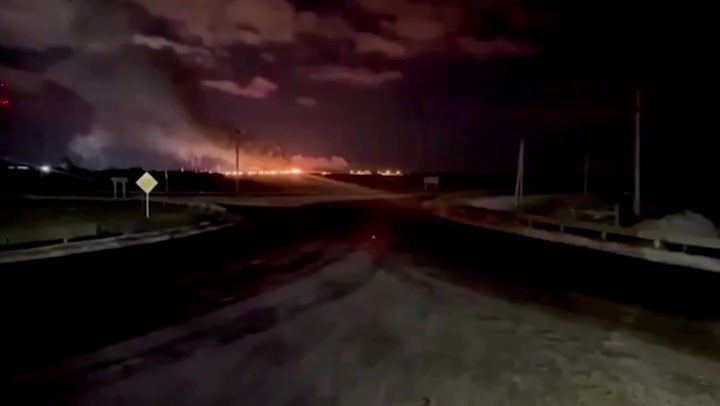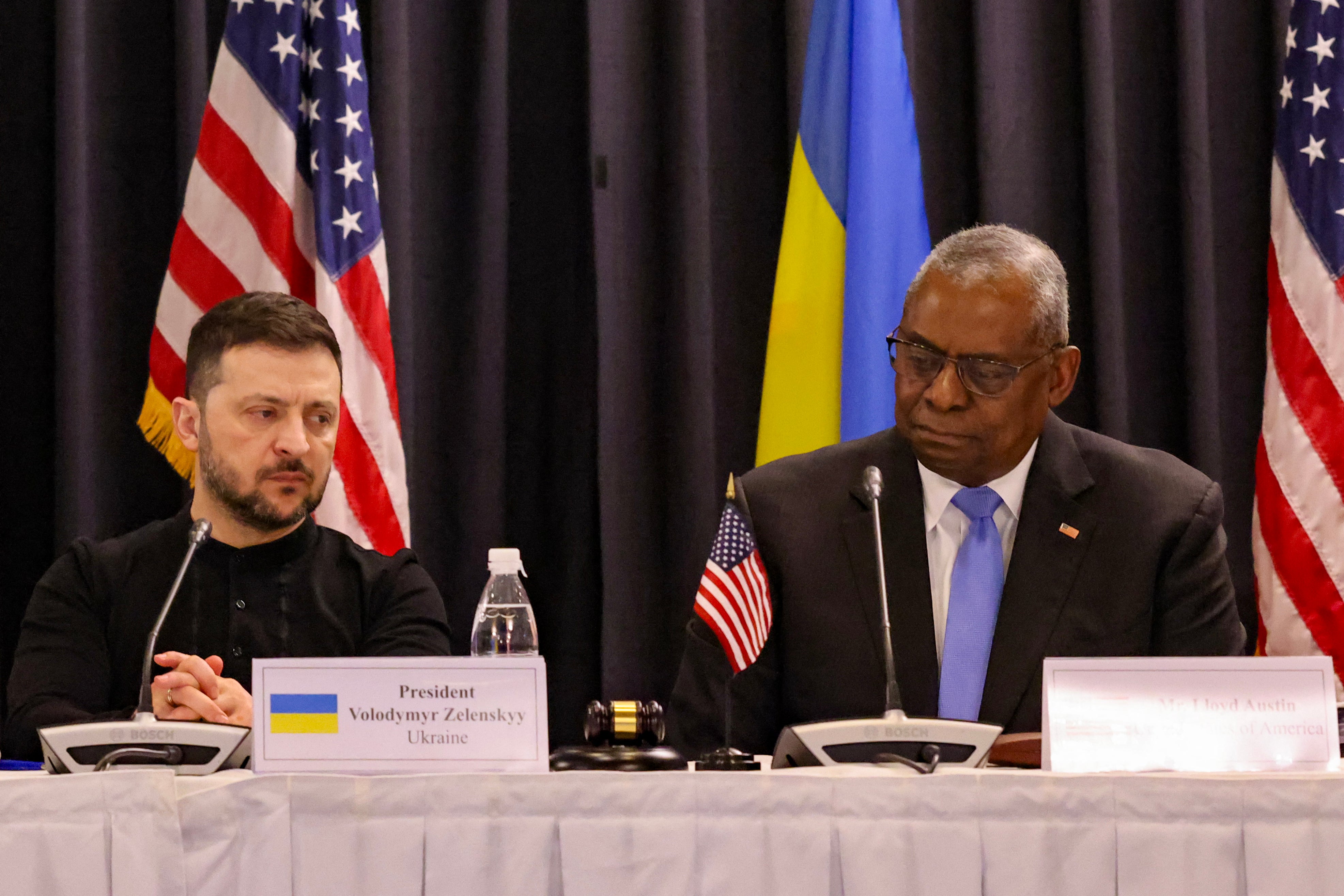US and UK will target Russia’s energy sector with new sanctions as Biden prepares to leave office
Biden administration officials say the sanctions are being imposed now because they are not likely to add to inflation

Your support helps us to tell the story
From reproductive rights to climate change to Big Tech, The Independent is on the ground when the story is developing. Whether it's investigating the financials of Elon Musk's pro-Trump PAC or producing our latest documentary, 'The A Word', which shines a light on the American women fighting for reproductive rights, we know how important it is to parse out the facts from the messaging.
At such a critical moment in US history, we need reporters on the ground. Your donation allows us to keep sending journalists to speak to both sides of the story.
The Independent is trusted by Americans across the entire political spectrum. And unlike many other quality news outlets, we choose not to lock Americans out of our reporting and analysis with paywalls. We believe quality journalism should be available to everyone, paid for by those who can afford it.
Your support makes all the difference.The United States and United Kingdom unveiled what they say are the harshest sanctions targeted at Russia’s energy sector since Moscow’s troops began a nearly three-year-old war on Ukraine in early 2022.
The sanctions will cover two major Russian petroleum producers and exporters — Gazprom Neft and Surgutneftegas — both of which are involved in the export of liquified natural gas and efforts to expand the Russian energy sector into the Arctic. They are expected to cut off Moscow’s revenue stream to the tune of billions of dollars per month, putting new strain on Russian President Vladimir Putin’s war effort against Ukraine.
Separately, the State Department will also block “two active liquefied natural gas projects, a large Russian oil project, and third-country entities supporting Russia’s energy exports” from access to the American financial system and add “numerous Russia-based oilfield service providers and senior officials of State Atomic Energy Corporation Rosatom” to its list of “designated entities” who are banned from the United States.
Treasury Secretary Janet Yellen said in a statement that the U.S. is “taking sweeping action against Russia’s key source of revenue for funding its brutal and illegal war against Ukraine.”

“This action builds on, and strengthens, our focus since the beginning of the war on disrupting the Kremlin’s energy revenues, including through the G7+ price cap launched in 2022. With today’s actions, we are ratcheting up the sanctions risk associated with Russia’s oil trade, including shipping and financial facilitation in support of Russia’s oil exports,” she said.
A senior Biden administration official who briefed reporters on the move said the White House was choosing to impose the new sanctions just days before President Joe Biden leaves office because both oil markets and the American economy are “in a fundamentally better place” than they were at any other point during the war.
“During much of this war, global supplies were tight and at risk of falling short of demand, which meant that reducing Russia's oil exports to the world would likely push up Putin's export revenues while raising prices at the gas pump for families in the United States and across the world,” the official said.
“Now, forecasters expect the global supply of energy to exceed global demand with ample capacity within and outside of OPEC, plus to increase production if necessary.”
The official noted that benchmark oil prices have dropped by $35 per barrel since the start of the war, with the average price for gasoline in the United States falling from $4 to just over $3 today. They credited Biden administration efforts to combat inflation for providing new flexibility to target Russian energy without harming the American economy.
“The context changed, and so the moment was ripe to change our strategy, and the President took action,” the official said.
A second administration official who also briefed reporters on condition of anonymity said the new sanctions will target 183 maritime vessels that are understood to be part of Moscow’s “shadow fleet,” as well as “dozens” of oil traders and oil field services providers based in Russia.
“Since the beginning of this conflict, the Biden administration, our partners in the g7 have taken significant action to reduce Russia's revenues from energy exports, including through the g7 price cap put in place in 2022 Russia's oil tax revenues in 2023 and 2024 were significantly lower than in 2022 before the price cap was implemented. This is the right time for these actions,” the official said.
In addition to levying the new sanctions on Russian oil and gas producers, the Treasury will also roll back an exemption in its’ sanctions regime that had permitted some transactions involving Russian banks with respect to the Russian energy sector.
Daleep Singh, Biden’s Deputy National Security Advisor for International Economics, said in a statement that the actions taken today represent “the most significant sanctions yet on Russia’s energy sector, by far the largest source of revenue for Putin’s war.”
“These sanctions will hit hard across every key node of Russia’s oil production and distribution chain, including against two of the four largest Russian oil producers, dozens of oilfield service providers, traders of Russian oil across the world, over 150 vessels moving seaborne Russian oil, and an oil terminal that knowingly received sanctioned oil from sanctioned vessels,” he said.
Singh added that the moves taken by the American and British governments would “collectively drain billions of dollars per month from the Kremlin’s war chest and, in doing so, intensify the costs and risks for Moscow to continue its senseless war.”
The new sanctions come just a day after the Pentagon announced approval of a half-billion dollar arms package for Ukraine, including air defense and air-to-ground munitions plus equipment to support Ukraine’s use of American-made F-16 fighter jets.
The $500 million tranche of aid represents the last of the funds authorized by Congress last year, and is the 74th such arms package to be disbursed to Kyiv since August 2021.
In a statement posted to X (formerly Twitter), Ukrainian President Volodymyr Zelensky said he was “grateful” to President Biden, the Biden administration and “the entire American people” for the new sanctions package, which Zelensky said would “deliver a significant blow to the financial foundation of Russia’s war machine by disrupting its entire supply chain: key Russian producers, insurance companies, service providers in the oil and gas industry, 184 shadow fleet tankers, logistics facilities, and third-country companies.”
“Such actions send a clear message: criminals must pay for their crimes. The less revenue Russia earns from oil and other energy resources, the sooner peace will be restored,” he said.
Zelensky added that he is “confident” that the new sanctions would “significantly reduce Russia’s petrodollar income and, with it, its ability to continue its aggression.”
Join our commenting forum
Join thought-provoking conversations, follow other Independent readers and see their replies
Comments